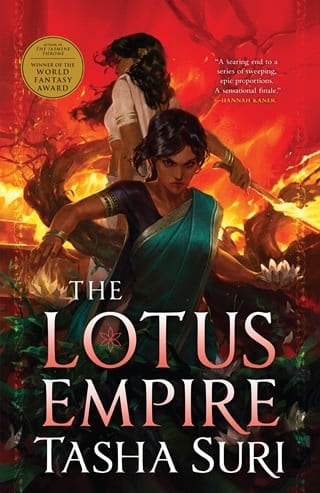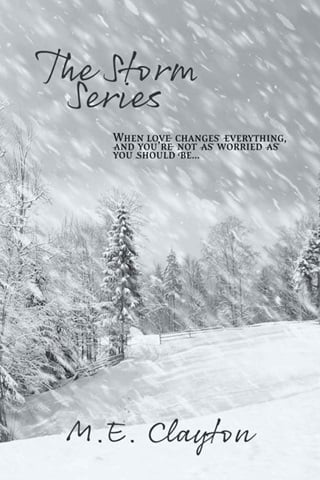Chapter 39 Bhumika
BHUMIKA
The rain stopped abruptly. It left behind a day that cracked the sky yellow. As the flooding began to recede, Bhumika knew it was time to leave and face the monastery again.
She was given a kind farewell. Gulnar kissed her cheeks, and the children hugged her and offered both her and Jeevan a little food to take with them. It wasn’t easily spared, and Bhumika would have liked to refuse.
She thanked them instead, and professed real pleasure in the small gifts of dried fruit and seeds. Let them have their pride. They deserved it.
The forest felt different in the aftermath of the flooding. Stranger, and unfamiliar. Many trees had fallen, leaving the wet ground bare. The birds and insects, so loud before, were silent.
They crossed the bridge and walked between the trees.
Her time snared in the village by the flood had felt like a respite—from her ghosts, from her knowledge, from the weight of her task. But that time was over, so it did not surprise her that once they had crossed the bridge, her watchers appeared again. She felt them before she saw them: a churning of water in her heart and her skull that made her lower her head from the heaviness of their presence.
When she raised her head, there they were: a dozen figures, young and old, mottled with water. In the sunlight their edges were hazy and soft.
She felt as if she were underwater too—floating, unable to control her limbs. She distantly heard Jeevan call her name as one figure walked toward her.
“Will you drink?”
A figure had stepped forward. Slim and small—maybe a child.
“ You must ,” the watcher insisted. “ Just a taste. ”
Fingertips touched her lips. A single drop of water—green as leaves. No more than that.
She felt new knowledge in shards. A warmth in her belly, squirming; a golden egg splintering open; life and life and life blooming and being born; and an ancient and new thing stirring beneath the soil, sap seeping from its root-gnarled flesh as its eyes slowly, inexorably peeled open.
“Bhumika.”
She returned to herself. The world around her swam for a moment, until her vision settled and she knew her body once more. Jeevan was holding her steady, his hands warm, eyes worried.
“Something is wrong,” she said. “Let me go, Jeevan.”
He released her, near-vibrating with tension, and she kneeled on the ground and pressed a hand to the earth.
Her ghosts watched, water swirling from them.
One shard struck her again—
Grief welled up in her, as it had when she’d heard a child crying so long ago. But now her grief wasn’t alien or formless. That droplet of strange water had carried something in it—laughter, and a life inside her, and the desolation that losing it had left behind.
She could hear Jeevan’s breathing and it made her grief swell, somehow. She couldn’t help but speak.
“The child I gave birth to,” Bhumika said. “Was it yours?”
He stilled. “The child,” he repeated.
“I’ve seen my own body, a time or two,” she said. The hand she hadn’t pressed to soil was curled against her stomach. She’d mapped the marks on her skin with her hands, silver where she’d been reshaped, not hollowed but molded to cradle another heartbeat, another life. The water she’d drunk had only clarified what she already knew.
“No,” he said, finally. “She was not my daughter.”
She. A daughter.
“Is she still alive?”
“Yes,” Jeevan said immediately—eyes suddenly soft. “Yes, Bhumika.”
She nodded. A jerky, wordless nod.
“Good,” she said. She swallowed around the sharpness in her own throat—a feeling like glass. “That’s good.”
She splayed her hand more firmly against the ground.
Underneath her palm, the life beneath that soil thudded like a heartbeat.
She must have moved, because Jeevan called her name, low and alarmed.
“It feels me,” she said, hushed. “It thinks I am calling to it.”
Jeevan kneeled beside her. She looked at him, meeting his gaze.
“There is a yaksa sleeping beneath this forest,” she told him. “I can feel it awakening. When it does so, the entire forest will flower with rot, and the people…” She paused, trying to shape her horror into better, calmer words.
“They will die,” he said. “I understand. Can you stop it?”
She shook her head. Maybe she’d had that power once, but not now.
He rose to his feet and offered her his hand. “We’ll go to the village and warn them. We can lead them from the forest to safety.”
“That will only save one village,” Bhumika said. She knew the enormity of what a yaksa could do. She knew . “What if they don’t listen, Jeevan?”
“We will convince them, Bhumika,” he replied. As if it were so simple.
She took his hand and stood.
Manjeet was already waiting for them, standing between the fallen trees at the base of the hill where the village stood.
“I don’t seek to bring you trouble,” Bhumika said. “But I fear your village is in danger.”
Manjeet walked toward her, and Bhumika realized she needed no convincing. The headwoman’s face had a gray pallor.
“It came so suddenly,” Manjeet said. Her voice trembled. “We don’t know what to do.”
She led Bhumika and Jeevan up the rising hill to the village. The people were huddled together in the center of the cluster of homes, whispering. They watched Jeevan and Bhumika pass them, no smiles on their faces now.
The old hut at the edge of the village where Jeevan and Bhumika had slept beside one another was gone. In its place was a rictus of trees, shaped into an arch. Bhumika walked toward it, one step, then two, then stopped. Every inch of her body felt cold in its presence. She knew what the arch was, and she knew what lay beyond it—even if she did not know where it would take her.
A seeker’s path.
The words came to her in a whisper. Bhumika bit down on her cheek hard enough that she could now taste blood, metal-sweet, flowering in her mouth.
“Don’t go any closer,” Manjeet said. “There’s rot in those trees and in the soil. You don’t want to get sick.”
Bhumika wouldn’t get it. Couldn’t. But it didn’t seem wise to say so.
“You can’t stay here,” Bhumika said. If a path existed, anyone—and anything—could walk through it. And surely they would. A yaksa was sleeping under the ground. Someone would come for it. The yaksa loved their kin too much not to. “We need to hide somewhere safe.” She turned to meet Manjeet’s eyes. “The monastery.”
“They won’t help us,” Manjeet said wretchedly. Then she cursed, rubbing her knuckles roughly against her forehead. “Those religious bastards, they won’t care . You understand that, don’t you?”
“It doesn’t matter,” Bhumika said. “The danger here is coming for them too. Soon they’ll see we may only stand a chance of surviving it together.”
 Fullepub
Fullepub 



